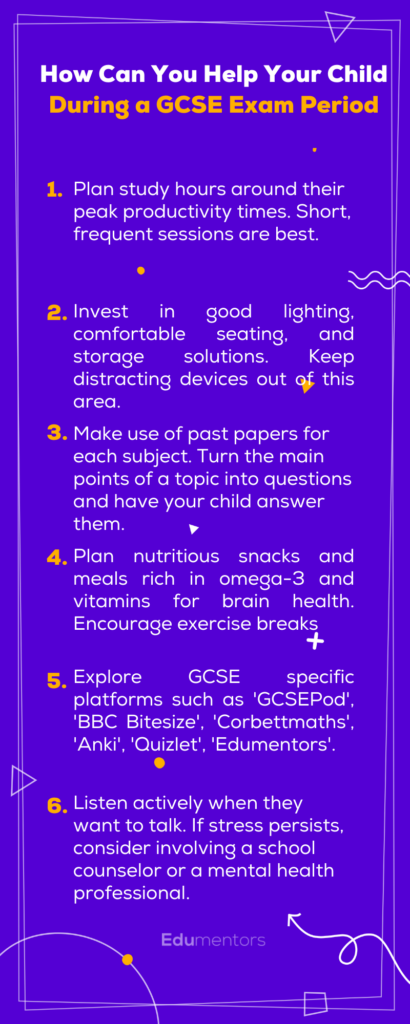Supporting Child Mental Health During GCSEs
GCSEs are one of the most challenging times in a student’s academic journey, and it’s no secret that the pressure to perform can take a toll on their mental health. As a parent, it can be difficult to know how to best support your child during this stressful time. That’s why in this blog post, we’re going to offer practical advice on how you can help your child prioritise their mental health during GCSEs.
From creating a supportive environment to promoting self-care, we’ll provide strategies that you can implement to help your child navigate this challenging period with confidence and resilience. So whether your child is about to start their GCSEs or is already knee-deep in revision, read on to learn how you can be their greatest ally in supporting their mental health.

Understanding the Mental Health Challenges of GCSEs
GCSEs can be an incredibly stressful time for students. The pressure to perform well can be overwhelming, and the fear of failure can lead to feelings of anxiety, stress, and depression. In fact, a survey conducted by the mental health charity Place2Be found that 60% of GCSE students feel pressure to succeed academically, with 20% saying that the pressure comes from their parents.
One of the biggest mental health challenges that students face during GCSEs is anxiety. The fear of not doing well on exams can cause students to feel anxious, nervous, and overwhelmed. This can lead to physical symptoms such as sweating, shaking, and an increased heart rate.
Stress is another common mental health challenge that students face during GCSEs. Exam pressure can stress students, causing symptoms like headaches, stomach aches, and fatigue.
Depression is also a risk during GCSEs. The stress of exams and the fear of poor performance can leave students feeling hopeless, unmotivated, and sad.
It’s important to understand that these mental health challenges are normal during the GCSE period. However, if left unaddressed, they can have a negative impact on a student’s wellbeing and academic performance. It’s crucial for parents to recognize signs of mental health issues and proactively support their child’s well-being
Signs Your Child Might be Struggling
During the GCSEs, parents should recognise signs of their child’s mental health struggles. Here are some common signs to look out for:
- ❓ Changes in behaviour. If you notice that your child is acting differently than usual, such as becoming more withdrawn or irritable, this could be a sign that they are struggling with their mental health.
- ❓ Changes in mood. If your child seems more anxious, stressed, or depressed than usual, this could be a sign that they are struggling to cope with the pressure of GCSEs.
- ❓ Changes in sleep patterns. If your child is having trouble falling asleep or staying asleep, or if they are sleeping more than usual, this could be a sign of underlying stress or anxiety.
- ❓ Changes in appetite. If your child is eating more or less than usual, or if they are showing a sudden change in weight, this could be a sign that they are struggling with their mental health.
- ❓ Avoidance. If your child is avoiding situations that they would normally enjoy or seems to be disinterested in their usual hobbies or activities, this could be a sign that they are feeling overwhelmed or stressed.
Remember that these signs can be subtle, and may not be immediately obvious. However, if you notice any of these signs in your child, it’s important to take them seriously and to take proactive steps to support their mental health.
Strategies for Supporting Your Child’s Mental Health

It’s crucial to recognise signs of your child’s mental health struggles during GCSEs and to proactively support their wellbeing. Here are some strategies that you can use to help your child prioritize their mental health during this challenging time:
- ✅ Create a supportive environment. Let your child know that you are there to support them, and encourage open communication. This can help them feel less alone and more able to cope with the pressure of GCSEs.
- st✅ Encourage self-care. Help your child prioritise self-care activities such as exercise, healthy eating, and getting enough sleep. These can all have a positive impact on their mental health.
- ✅ Promote relaxation techniques. Encourage your child to practice relaxation techniques such as deep breathing, meditation, or mindfulness. These techniques can help to reduce anxiety and stress.
- ✅ Help with time management. The pressure of GCSEs can often be related to the amount of work and revision that needs to be done. Help your child with time management techniques, such as creating a revision schedule, to help them feel more in control.
- ✅ Seek professional help if needed. If your child is showing signs of a mental health challenge such as anxiety or depression, it’s important to seek professional help. This could involve talking to your GP or accessing mental health services.
Remember that supporting your child’s mental health during GCSEs is a team effort, and there is no one-size-fits-all solution. Be patient, compassionate, and open to communication, and together you can help your child navigate this challenging time with confidence and resilience. Read more here on how to handle teen mental health.
Seeking Professional Help
Despite parents best efforts, a child’s mental health issues during GCSEs may become too much to handle alone. If signs of anxiety, depression, or other mental health challenges affect their ability to manage GCSE pressures, it’s crucial to seek professional help.
There are a variety of professionals that can provide support, including:
- School counselors. Most schools have a counselor on staff who can provide support and guidance to students. They can help your child work through their challenges and develop coping strategies.
- General practitioners (GPs). Your child’s GP can provide an initial assessment and may refer your child to specialist services if needed.
- Child and adolescent mental health services (CAMHS). CAMHS provides mental health services to children and young people up to the age of 18. They offer a range of services, from counseling to more intensive therapy.
- Private therapists. If you prefer, you can seek out a private therapist for your child. Make sure to choose someone who is licensed and has experience working with young people.
It’s important to remember that seeking professional help is not a sign of weakness, but rather a proactive step towards supporting your child’s mental health. Don’t be afraid to reach out and ask for help if you think your child needs it.
Conclusion
Supporting your child’s mental health during GCSEs can be a challenging task, but it’s an important one. By understanding the mental health challenges of GCSEs, recognising the signs that your child may be struggling, and using proactive strategies to support their wellbeing, you can help your child navigate this stressful period with greater confidence and resilience.
It’s also important to remember that seeking professional help is a crucial step in supporting your child’s mental health. Whether it’s through school counselors, GPs, CAMHS, or private therapists, there are a range of professionals available to provide support and guidance.
If you think that your child would benefit from extra help with exam material, check out Edumentors. At Edumentors, tutors understand the importance of supporting young people during their GCSEs. These tutors not only have expertise in their subject areas, but they also have the skills and experience to act as role models for your child. Many of these tutors are close in age to GCSE students themselves, which means that they can offer a relatable perspective on the challenges of GCSEs and provide valuable guidance and support.
Remember, as a parent or guardian, you play a crucial role in supporting your child’s mental health during GCSEs. By working together with professionals and using proactive strategies, you can help your child thrive both academically and emotionally during this challenging time.









